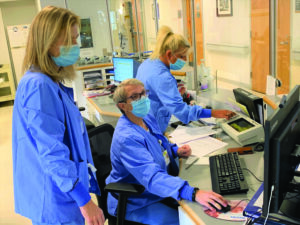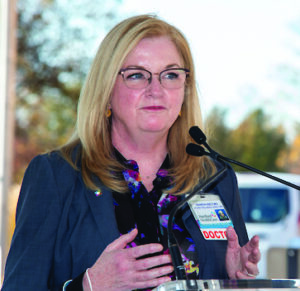Walking the walk
Know yourself and your needs
Healthcare workers know the ways to uncover and soothe fear, stress and anxiety in patients, families and customers.
“Leveraging this innate caring skill to support our own growth is our opportunity during the COVID-19 pandemic,” said Dr. Sharon Kiley, Hart- ford HealthCare’s chief wellness officer. “Our HHC Leadership Behaviors make this much easier — be in the moment, be authentic and be humanistic.”
Everyone experiences stress differently, added Dr. Jennifer Ferrand, wellness director, but for most, it is physically and mentally draining.
“We can redefine self-care so it doesn’t feel selfish or frivolous, so we are more inclined to seek help and use resources available right here,” Dr. Ferrand explained. “It’s about knowing yourself.”
Essential ingredients for self-care include recovery and repair when we’re not working, and improving our ability to separate work and home lives.
The End of Day Checklist can help by making us aware of our thoughts and feelings at the end of the work day, helping us reflect on the day’s accomplishments and choose what to do next.
The Wellness Department also offers training and consult options to support leaders as they optimize the performance and resilience of their teams. Hoping to ultimately
develop a Wellness Center of Excellence would include focusing on culture, workplace safety and efficiency, personal resilience and mental health.
“We have all the components here,” Dr. Ferrand said. “We can be a model for the country.”
Click here to download your copy of the End of Day Checklist.
Colleague Wellness
By Susan McDonald

Kelli Odenwaelder, left, clinical manager of maternity at Charlotte Hungerford Hospital, chats with Laurie Talbot, PCT, center, and Carey Hock, RN, as part of her weekly check-ins with colleagues.
Last summer, as the frenzy of COVID-19’s first wave waned but anxiety remained, Teresa Fuller focused on her colleagues.
Fuller, vice president of patient care services in Hartford HealthCare’s (HHC) Northwest Region and co-leader of the Culture of Wellness Subcommittee, realized frontline teams, reeling from the spring, “needed extra support.”
“We want to be there for people,” Fuller said of the Nursing Peer Support program she helped develop with Gail Nelson, director of nursing quality for Hartford Hospital, connecting people in need with understanding colleagues.
Although launched mid-pandemic, it represents broader efforts to cultivate an environment that supports wellness, based on the system’s commitment to its colleagues. HHC launched its Wellness Department in October 2019 with the hiring of Vice President and Chief Wellness Officer Dr. Sharon Kiely, one of the few nationwide.
The inaugural Wellness Council meeting convened days before the COVID-19 lockdown and members quickly collaborated to support colleagues.
“Today, more than 120 volunteers across the system are actively involved in colleague wellness,” Dr. Kiely said.
“Our vision is to create an exceptional healthcare workplace by advancing the well-being of all who care for others.”
That vision served the system well during the pandemic.
“We had to be agile and meet constantly changing needs that we couldn’t have imagined before COVID-19,” Dr. Kiely said, giving such examples as identifying alternative housing, supporting childcare needs and providing emotional support.
“Healthcare workers provide care for everyone else,” explained Wellness Director Dr. Jennifer Ferrand. “COVID-19 gave us an opportunity to emphasize the importance of decompression and the benefits of self-care in order to promote safety, resilience and optimal mental health.”
The Wellness Department is focused on building resilience as a critical strategy both during the pandemic and beyond.
“Resilience is the ability to experience stress, recharge and come back perhaps stronger than before. It is an active process, like building muscle,” Dr. Kiely said. “We focused on how to keep our colleagues strong, providing unparalleled services in the industry.”
This was no small feat. At the height of the pandemic’s first wave, a team led by Dr. Kevin Young surveyed HHC colleagues about their psychological experiences.
“Of the almost 8,500 survey participants, most were concerned about work-life balance and well-being, reporting symptoms like stress, insomnia and depression,” Dr. Kiely noted.
It also became clear that there was an opportunity to create an environment where colleagues feel safe asking for help. Wellness Manager Hillary Landry said many of the group’s efforts promote the idea that asking for help is a sign of strength.
“We are creating the feeling that, in order to provide for others, you have to take care of yourself,” she explained.
It seems to be working, as Fuller found.
“We’re trying to change the culture. They are all people who put others’ needs before their own and don’t think they need support,” she said. “We’ll get there. It will take continuing to talk about it. It’s about what you need to get through it.”

Dr. Sharon Kiely
Tools help build a culture of wellness
In response to the unprecedented needs of our colleagues, Hartford HealthCare (HHC) and its Wellness Department launched many initiatives focused on leadership, teamwork and support to foster a culture of wellness and well-being.
SUPPORT
1. Colleague Support Center (860.972.2400). Available 24/7, this line addresses emotional support and such practical needs as childcare, housing and financial help though the Colleague Assistance Fund.
“The needs of our colleagues inform what the Support Center provides,” explained Vice President and Chief Wellness Officer Dr. Sharon Kiely.
2. Health and wellness intranet resource page containing tips, tools, strategies and resources for mind, body and spirit.
https://intranet.hartfordhealthcare.org/coronavirus
3. Peer support. HHC launched a Physician and Advanced Practitioner Peer Support Program in October 2019 to encourage providers to reach out to each other for support and reduce the stigma surrounding mental health. In August 2020, efforts expanded with Nursing Peer Support. More than 40 nursing leaders and
65 nurses were initially trained through this effort, which the Wellness Department hopes to expand to all colleagues in 2021.
4. Support tools.Wellness champions identified needs in the colleague engagement survey and day-to-day huddle conversations to create tools. The End of Day Checklist, for example, helps colleagues decompress when leaving work.
LEADERSHIP
5. WellnessResiliencypilot.Thispilottrains leaders in personal and organizational resilience based on the tenets of psychological first aid. The four-hour training is available to anyone on HealthStream.
“The goal is to drive empathy and listening skills, framed in our H3W behaviors,” Dr. Kiely said. “You can’t be in the moment if you yourself are hanging on for dear life.”
Kelli Odenwaelder — a 23-year nurse and clinical manager of maternity at Charlotte Hungerford Hospital, one pilot site — welcomes the culture change.
She reaches out to three colleagues weekly, ask- ing how they’re doing. Other efforts – a weight loss challenge and resilience journaling – came from her team.
“It’s awesome for me as a manager. It’s opened my eyes to someone’s needs. They’re juggling so much with work, childcare, distance learning. We talk about these things every day at huddle,” Odenwaelder said, adding that happy staff translates into improved patient care.
6. Consultation. Help is available to leaders having trouble at work or personally.
TEAMWORK
7. Wellness Wednesday webinars. Addressing such topics as nutrition, exercise and stress relief, these are free to colleagues. Virtual concerts demonstrate the soothing power of music. At
the height of the pandemic, webinars ran three times a week. All are available at any time on the intranet.
8. SocialMedia #SelfcareSundays. These bring reminders, tips and tools for colleagues to practice self-care.
Follow @hartford_healthcare on Instagram and @HartfordHealthCare on Facebook.
